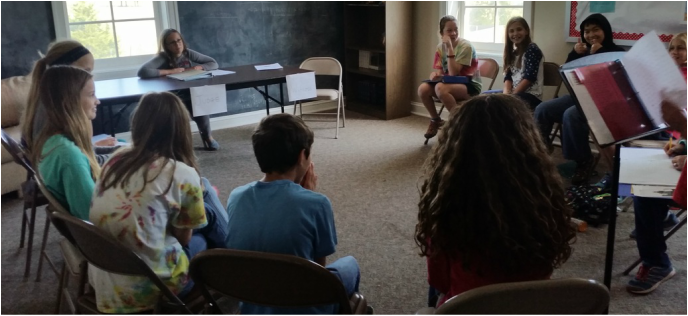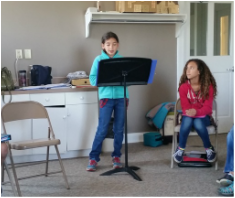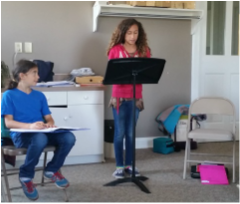|
with Jayne Besjak Peter Rabbit Found Innocent of All Charges!Our class met in the courtroom this week to conduct the trial of McGregor vs. Peter Rabbit. The prosecution and defense teams were briefed on standards for direct and cross examination questioning (see below) and used the first few minutes of class to organize their witness lists and questions in preparation for trial.  We heard well formulated opening statements from both the prosecution and defense. Each team provided sound theories and narratives to support their side, and gave overviews of witness testimony that would be presented. As we move forward in the class, we will practice how to deliver dynamic opening statements that connect with the audience to most effectively make our case. Teams then launched into the direct and cross examination phase of the trial. Students learned that there are rules for questioning witnesses, and that these are part of what is termed the "Rules of Evidence and Procedure". The purpose of direct examination is to allow the witness to narrate a story, taking care to ask for specific information relevant to your case. Attorneys may not ask leading questions (ones in which the attorney supplies information with the intent of getting a 'yes' or 'no' answer). Direct questions are generally open-ended and usually begin with such words as how, when, where, why, explain. On cross examination an attorney may ask leading questions, but can only ask questions about information brought out in direct examination, or relating to the credibility of the witness. As we found out at our trial, attorneys should also be careful not to ask questions if they aren't confident what the witnesses answer will be! We introduced several types of objections such as leading question and irrelevant evidence. Objections are violations of the rules of evidence and are made directly to the judge who can either sustain or override the objection. We will build more on our understanding of objections and when to use them at our next class meeting. Everyone in class did a great job preparing for and participating in this introductory mock trial. We stopped frequently during direct and cross examination to discuss the wording and content of their questions. I was very pleased that once things got rolling, most students jumped at the opportunity to formulate questions and ask the witnesses! Overall, I felt that both sides did a reasonably good job of thinking through their case. However, much more detail could have gone into preparing for and questioning the witnesses, which would have strengthened their arguments considerably. Of course lawyers spend many years training for the day when they will try a case in a courtroom, whereas students had only a few short hours! With each mock trial, students will learn better how to prepare their case, thoroughly question and cross examine witnesses, and anticipate what the the other side might be plotting. This was a fantastic start! After listening carefully to each side, our jury for the day returned a verdict of not guilty for both criminal trespass and robbery charges. Although the prosecution team felt disappointment with the verdict, it provided a valuable opportunity for all students to see that in a trial you never know what the outcome will be until the jury speaks! The defendant is presumed innocent and the burden of proof is on the prosecution. It is not enough to "feel strongly" that the defendant committed a crime - you must prove it during the trial with a sound argument, convincing opening/closing statements, and thorough questioning of witnesses. Keep in mind that the jury does not know what you know or how you have connected the dots, so you must show them during trial. HomeworkThere is NO CLASS next week (10/13)! We will meet back in the classroom on October 20th.
For homework, students should carefully read the Radio News Flash provided in class. It contains the summary of our next case against Jack (of beanstalk fame). Please also read the entire story of Jack and the Beanstalk, as we will be bringing the case to a Grand Jury in our next class. Have a wonderful holiday weekend! Comments are closed.
|
Categories
All
Archives
May 2016
|



 RSS Feed
RSS Feed